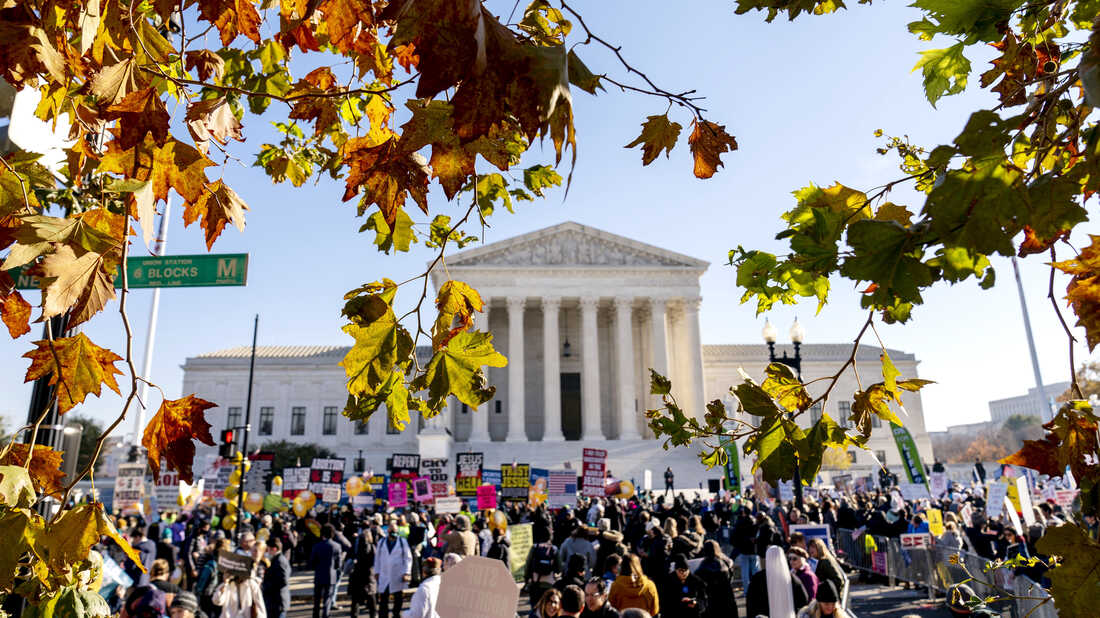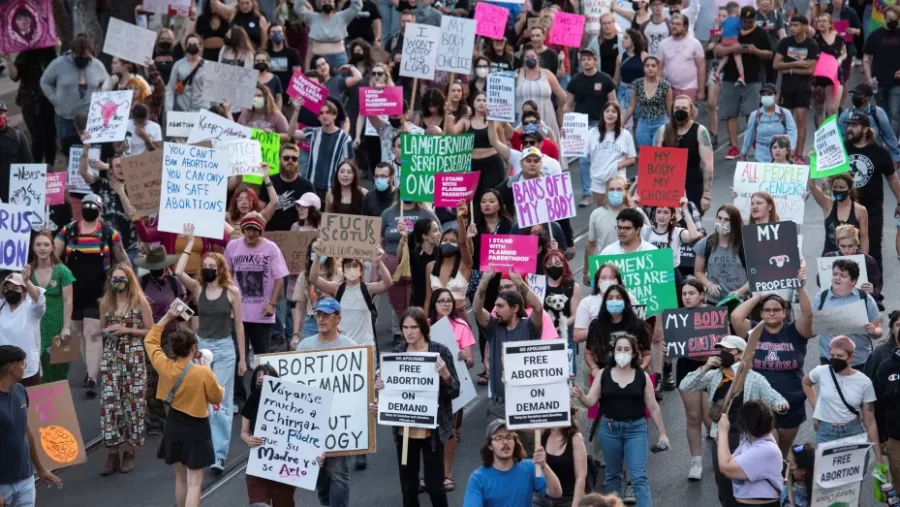Prove Yourself Wrong
Where do we draw the lines?
May 27, 2022
 Amidst the overturning of Roe V Wade, the grand argument on abortion has taken its infamous platform once more. Reproductive health care is at an alarming risk, and amidst the chaos I have found myself enraged and confused. If I am truly honest, I was surprised on the sheer size of our population who are so genuinely pro-life in our day and age. I have strong pro-choice feelings towards abortion, so I could not help but think about who in my immediate social circle is pro-life. I know they are not malicious or terrible, yet the connotations I had built in my head about the pro-life community was admittedly growing to be something I am not proud of.
Amidst the overturning of Roe V Wade, the grand argument on abortion has taken its infamous platform once more. Reproductive health care is at an alarming risk, and amidst the chaos I have found myself enraged and confused. If I am truly honest, I was surprised on the sheer size of our population who are so genuinely pro-life in our day and age. I have strong pro-choice feelings towards abortion, so I could not help but think about who in my immediate social circle is pro-life. I know they are not malicious or terrible, yet the connotations I had built in my head about the pro-life community was admittedly growing to be something I am not proud of.
When taking a stance on important topics, confirmation bias poses as a silent enemy. Only keeping in touch with one side of an argument for the mere sake of feeling right is dangerous, so I decided to research why a vast community of people are against abortion to attempt to prove myself wrong in case I am missing something. Every time the argument on abortion inevitably bubbles itself up into political and philosophical discussions, I have noticed that my reasoning on why I am pro-choice are solidified within my emotions and the media that I am surrounded by, yet rarely ever challenged. Although abortion is a greatly emotional topic, I want the foundation of my thesis on abortion to be thoroughly researched instead of skimming the other side of the argument. From said research I have found the two most compelling pro-life arguments are based on drawing the lines within embryology and bodily autonomy.
Regarding The Argument Of Faith
I grew up with a strong Christian background, and although I do not personally identify with it I completely understand how important religion is to some people- everyone must respect that. Yet the reason why I will not be entertaining this argument is simple: separation of church and state and freedom/mutual respect of belief. Pro-choicers are all stereotyped to be religious, but arguing abortion soley based on personal religious beliefs is only the religious extremist side of the pro choice community. I simply think there are more intriguing pro-life points that should be addressed.
Freedom of religion was one of the founding rules of our country, so while I respect everyone’s right to believe in whichever god they please, I expect the same respect for agnosticism/atheism. Living your life by the rules of your religion is your right, but that right does not extend into telling nonreligious/agnostic/atheists what to do with theirs.
***(Agnostics are people who acknowledge that nothing is confirmed when it comes to higher beings, but are not opposed to the idea of one. Atheists deny the existence of a higher power in its entirety. Both are not considered to be religions but have been treated as a religious equivalent in Supreme Court cases, and the United States is not a theocracy.)
There are a million articles and videos that go further into depth (like this one) about how solely using religion/ personal belief systems in a debate on abortion is an infringement on religious/ human rights of others. Regardless of respecting others personal religions/ beliefs, this argument is an undeniably weak point when it comes to a debate on abortion legality. I have found a lot more compelling and stronger pro-life arguments that I would rather explore, ones that have stimulated the dilemma and my personal ethics on abortion. With this statement on the religious argument behind abortion out of the way, I would like to address the most intriguing points that I have found.
The Embryology Factor: Life At Conception
When discussing the science behind conception and embryology, we must draw the line where life begins. Whether it be at the moment of fertilization or when certain anatomy such as a heart or brain is formed, this discussion is one that has continued for so long because there is no clear line. According to the Cleveland Clinic, the “embryos genetic make-up is complete, including its sex” at the moment of fertilization. Embryology teaches us that life does in fact begin at conception.
Now we’ve all heard the demeaning ‘clump of cells’ phrases from pro-choice communities and they are also not wrong. An embryo is technically a clump of cells that has life and genetic makeup, and it is understandable why pro-lifers get upset when an embryo is demoted to a phrase that seemingly invalidates its potential. An embryo is alive, it is undebatable. Yet the argument spans further; when does an embryo become a baby?
The debate on when an embryo becomes a human is highly controversial. Is it based on the ability to feel pain? The formation of certain body parts such as a heart or brain? The sustainability of life outside of the womb? The line can be drawn anywhere depending on a person, which is why I believe this debate is not the strongest argument for either side. Both are valid arguments, and there is no rule book stating that either is right. And though I have found myself siding with the truth of life at conception, I would like to pose this question: why are certain embryos so highly coveted while others are discarded without punishment? Embryologists are not arrested when they ultimately discard weaker embryos in favor of the strongest options in the IVF process. Countless embryos that could potentially harbor a fetus given enough care and time for gestation are thrown out daily, so why is that any different from an early miscarriage or early abortion? I do not intend to draw the line between baby and embryo, but merely point out that there is a clear difference between the way we treat embryos versus babies beyond certain trimesters. I may have my own opinions on where we should draw that fickle line between embryo and baby, as may you, yet opinion alone does not solve this puzzle on the spectrum.
This argument has solidified my stance on the pro-life point of life at conception, but ultimately was not the greatest challenge to my overall pro-choice beliefs. The greatest challenge that I had come across lies within my strongest pro-choice argument- the bodily autonomy stance.
The Bodily Autonomy Factor
In February, I participated in our school blood drive. In order to do so, I had to answer an extensive survey on my personal history and chug a nasty, metallic tasting water bottle to get my blood pumping. Yet the medical professionals were not to collect even a drop of blood without a permission slip; a consent form signed by none other than yours truly. I had received a letter in the mail sometime after thanking me for my donation that had gone to some nearby hospital and hopefully helped save a life. Blood donations save lives on a global scale, yet it is not required. Organ donations are not mandated, even if the lack of that donation will cost someone their life. In the same way, these vital donations cannot be obtained without consent from the donor’s body, those who can get pregnant are not required to donate their uterus- even if it costs someone their life.
When it came to researching pro-choice points on this topic, I was the most stubborn. Bodily autonomy is something that is held dear in the eyes of the constitution, so I was most shocked to find hypocrisy from pro-choicers using this exact logic. Josh Brahm of the Students for Life organization (in this YouTube Video) makes a very compelling argument on late-term or post-viability abortion. Those who are pro-choice that I have asked to share their opinions on late-term abortions have for the most part been against it. That directly contradicts the bodily rights factor, which Brahms points out leads to a difficult dilemma for the pro-choice argument- abandoning the bodily rights argument or becoming an abortion advocate all the way up to active labor. This dilemma is something I had to also digest, and it honestly did not sit well with me. I have found that the majority of abortions take place in a time frame where it is deemed legal, and only 1.3% of abortions in 2015 were past 21 weeks of pregnancy.
I refuse to judge anyone getting an abortion for any reason, yet it was admittedly harder to come to terms with the idea of abortion without limitations up to labor- even with such a small percentage. Of course, there are medical exceptions if it came down to the carrier or child that I’m sure people can sympathize with regardless of view on abortion, but when unleashing abortion without limitations there are bound to be some cases that do not resonate. It is a hard pill to swallow, but I have ultimately come to two different conclusions: current laws do not support the bodily autonomy stance to the bitter end, but simultaneously I still have no room to judge someone’s reasons for an abortion. Though it may not sit right with me and even many other pro-choicers, in order to sustain the bodily autonomy stance we must acknowledge abortion in any case.
To be perfectly clear, I am not trying to enforce my newfound beliefs on anyone, regardless of pro-life or choice. It is a difficult pill to swallow for the pro-choice community, and even then some may disagree with it. But it is a dilemma we pro-choicers must face, a challenging question we must ask ourselves. Are you willing to support your beliefs to the finish line? Is there yet another line that we must draw regarding viability, even if it goes against the true fundamentals of the bodily autonomy argument?
What I Have Learned And Where I Stand
I am glad that I have found points that have thoroughly challenged my views on abortion. Life at conception is undeniable, but on the same side of the coin comes the vital discussion of when we consider an embryo a baby if we were to set limitations on abortions. Those said limitations also are a crucial part of this discussion, and it was the greatest challenge I have found within the bodily autonomy debate.
So where exactly do I stand? I still am pro-choice, but I now understand how immense the necessity for discussion is. It is unfair for only one person or one group of people to decide, it is crucial that we decide together on those fine lines. Although I still remain strong in my beliefs safe abortions should stay legal, I cannot lie and say confirmation bias did not become my enemy. I was only surrounded by media and words of peers that made me feel more comfortable within my belief, but it silently blocked out any ideas from someone who felt differently than I do. The gravity that comes with abortion is not without validity from both sides of the spectrum, and while this article was not structured to come up with the right answer at all, I hope to spark a conversation that looks more in-depth to both sides of the argument.
Conclusively, I am still scared. I am scared of getting my rights taken away, and scared for those who might be forced to birth a child that they cannot take care of. But fear made me wrap myself in the comfort of pro-choice Instagram infographics and only engage in discussions with those I know have similar views to myself. We need to strive further than that. We need to discuss what we feel and why we feel it, especially when it comes to environmental influence. I may have not succeeded in converting to the other side of the argument, but I have challenged myself into thinking beyond my own confirmation bias. So, I extend the challenge to those reading this article; prove yourself wrong.
Questions I Have For Those In The Pro-Life Community
I have focused my research on two main points in this article (both for the sake of length and efficiency), but I still have quite a number of questions for the pro-life community. I fully intend on researching further into these questions myself, but I thought it wouldn’t hurt to at least ask anyone reading this article their opinion.
- What do you think about people who cannot financially or mentally support a child? Should they still be subjected to birth even when they are homeless, depressed, or even addicted to substances?
- Postpartum depression is a danger even to parents that love their children. How should we go about dealing with the mental compensation of someone who did not want their child yet was still forced to have it?
- Some pro-lifers agree that even in cases of rape abortion should be illegal. My first question is why should the mother be subjected to giving birth to a child they did not consent to carry? It seems cruel to subject someone to let two beings take control of their body without consent. My second question applies to those that believe that abortion in cases of rape should be legal. Court cases typically take months to come to a conclusion, especially with cases of rape. How should we discern rape cases in a timely manner where the abortion can take place before birth? (please keep in mind rape victims sometimes do not even comprehend they were raped in time to get a rape kit done, ex: cases of rape during a relationship, non-consensual insemination, and general pressure to keep silent)
- How would we tell the difference between a natural and forced miscarriage (there are many home remedies spreading on the internet these days with information on how to purposefully induce a miscarriage. Even without those remedies, some could engage in reckless behavior such as excessive drinking/ substance abuse in order to increase their chance of miscarriage)? Does either deserve criminal punishment?
- How do you feel about birth control? Should it be illegal?













Anonymous Rising Junior • Jul 10, 2022 at 11:23 pm
Well Hannah, you’ve graduated. You might not even see this comment, but that’s okay; it can be an answer for anyone who stumbles on this page randomly. Hannah, throughout your senior year, your articles have managed to entertain me whenever I had some free time on a Friday. I remember seeing the first article you published and resonating deeply with it due to crawling out of an 8-month religious phase and falling into a deep bout of Depression.
I don’t know where you are, or where you got into, or what you ended up deciding what to do in the end, I just know that your bio says that you were planning to be a therapist for kids. Wherever you went, I know you’re going to do great in life. After all, not many students can claim that they’ve gotten the comment section of their political article raided.
Now, time for the answers to your questions (this is why I chose an anonymous name, simply since I don’t want to be targeted for my political beliefs). Just so you know, if you’re reading this, you can head on over to r/prolife to get these answers for yourself, but if you want to keep reading, you can. I have these answers from there and from my religious phase.
1. From what I’ve heard, yes. The logic here is that you should still be subjected to birth because the fetus is seen as an individual human being. For them, they might believe in taking the child away once it’s born, but they don’t want it to be aborted since it would be killing someone for the actions/situations of another.
2. They would expect you to still have the baby since it would be seen as the equivalent of killing someone just because they’re in an unfortunate situation.
3. Hmm…this one is a tricky answer. It’s tricky simply because we all know about people who rape the disabled, young, and vulnerable. Hence, why many pro-lifers support abortion in this case However, the concept of being “pro-life” involves not just the views of the mother, but also the baby (in other words, it goes both ways here). Side 2 of this debate says that the baby didn’t choose to be there in this case either, which is why pro-lifers believe in forcing the mother to have birth at this point. They see it as killing a baby. I answered this question quite poorly, so here is a thread for it:
https://www.reddit.com/r/prolife/comments/vuq3u8/why_cant_a_rape_victim_get_an_abortion/
5. 2 sides, one coin. A lot of pro-lifers support birth control, but there are some that don’t. Here’s another thread, it has people who support and don’t support it in the comment section:
https://www.reddit.com/r/prolife/comments/vrhsvx/theyre_coming_after_birth_control_next_according/
Hannah, I’ll never know you, you’ll never know me, and you might never see this comment. The one thing I want you to remember is that your articles definitely contributed to campus culture, and they did entertain many other than myself. You have a bright future waiting for you, make sure to attend it. 🙂